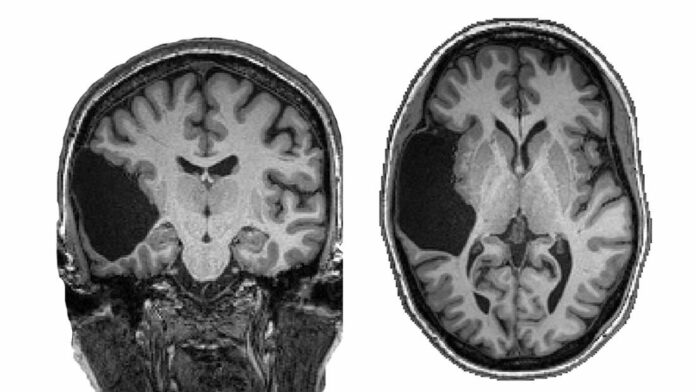
Researchers at MIT are investigating the brain of a woman, known by her initials EG, with a missing temporal lobe.
In 1987, EG underwent a brain scan at George Washington University Hospital for an unrelated reason. Surprisingly, the scan revealed that she was missing her left temporal lobe. Instead, the area contained cerebrospinal fluid. Despite missing a part of her brain, EG has had a successful life and career. Not only does she have a graduate degree but also is bilingual and speaks fluent Russian. However, EG’s peculiar condition left several doctors dumbfounded. They failed to understand how EG did not develop seizures, learning disabilities or any language processing problems.
In 2006, EG thought she’d be a good fit for a study at the Massachusetts Institute of Technology (MIT) investigating the brain’s reaction to music. The team instead connected her with Dr. Evelina Fedorenko, a cognitive neuroscientist at MIT. At the time, Dr. Fedorenko and her team were investigating the brain regions involved in the development of language and learning. They decided to conduct functional MRI scans of EG’s brain and investigate whether the frontal language areas can develop independently of temporal regions.
According to the study published in Neuropsychologia, they first recorded her brain activity while she performed language processing tasks. Next, they compared these results to that of 90 controls with an intact left temporal lobe. Furthermore, EG also performed math tasks while undergoing brain scans.
We find that—as expected for early left-hemisphere damage—EG has a fully functional language network in her right hemisphere […] and intact linguistic abilities. However, we detect no response to language in EG’s left frontal lobe.
study authors
Results revealed that the lack of a temporal lobe had somehow caused the development of a fully functional language network on the right side of the brain. However, it is unclear how that came to be.
What Helps Process Language?
Both the frontal and temporal lobes play a role in language processing. The temporal lobe develops at an earlier age than the frontal. Since EG had a missing temporal area, study authors wondered whether the frontal language areas can develop independently of the temporal region.
We asked whether frontal language areas emerge in the absence of temporal language areas through a ‘deep-data’ investigation of an individual (EG) born without her left temporal lobe.
study authors
While the study did find a language network in the right temporal lobe, they did not detect any language processing in EG’s left frontal lobe. Thus, revealing that temporal language areas are a pre-requisite for the emergence of frontal language areas.
Located behind the temples, the temporal lobe is responsible for processing emotions, language, memory, and auditory information. Similar to other lobes in the brain, the temporal also has a right and a left part. The left lobe is mostly dominant in people and plays a role in understanding language, forming speech, learning, and memorizing verbal information. Whereas the right lobe is involved in learning and memorizing non-verbal information (e.g., music and drawings), and understanding facial expressions.
Damage to the temporal lobe can cause:
- Speech problems
- Impaired verbal and non-verbal memory
- Difficulty recognizing faces
- Impaired learning
- Apathy
- Deafness
- Impaired music skills
- Amnesia
However, despite missing the left temporal lobe, EG did not demonstrate any of the above symptoms.
The Case of the Missing Temporal Lobe
It is unclear how EG’s left temporal lobe came to disappear. Doctors predict that she likely suffered a stroke as a baby. However, EG’s sister also has a missing temporal lobe, but on the right side. Similar to EG, she is unaffected by the missing region. The researchers suggest that there’s likely a genetic link that predisposed both the sisters to an early childhood stroke.
For now, my brain is special, unique, and interesting, and I am excited that it can help neuroscientists understand the plasticity of the human brain
EG
Dr. Fedorenko and her team plan to conduct more studies on EG and her unique brain and publish more studies. They also hope to investigate the effect of the missing temporal lobe on EG’s auditory system. Moreover, the team has also recruited EG’s sister for a future study aimed at understanding the emotional processing functions of the right temporal lobe.
EG’s case demonstrates the brain’s ability to compensate for any damage caused early in life. This is not the first time that scientists have discovered a missing brain region in an otherwise healthy adult. Previously, researchers reported the case of a 24-year-old with a missing cerebellum. The woman was most likely born without one, but despite it she did not suffer from any speech difficulty or mental impairment. Thus, revealing that the brain can compensate for any loss or absence early on in life. However, the brain’s flexibility to make up for the function usually declines with age. And any damage sustained in adulthood can have serious consequences.
Case studies such as these are often not enough to derive any conclusions. However, they provide doctors with detailed information of patients and their brains. And help lay the foundation for future studies.
Reference:
Greta Tuckute et al, Frontal language areas do not emerge in the absence of temporal language areas: A case study of an individual born without a left temporal lobe, Neuropsychologia (2022). DOI: 10.1016/j.neuropsychologia.2022.108184



